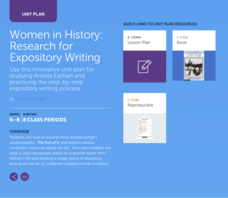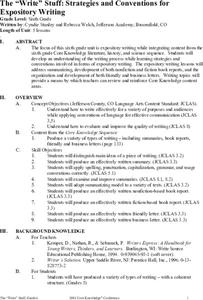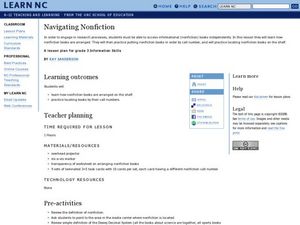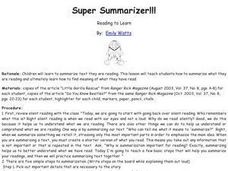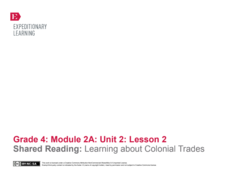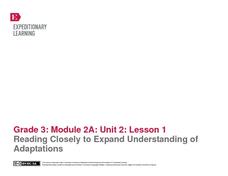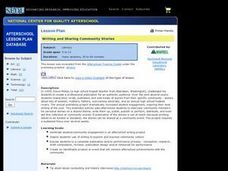Curated OER
Narrative Writing vs. Explanatory Writing
The class discusses the different purposes an author has for writing. The focus of the discussion is on writing to tell a true story and writing to give information about a specific topic. There are writing purpose sorting cards embedded...
Turabian Teacher Collaborative
Parts of Argument II: Article Critique
Break down the parts of argumentative writing with a critical thinking activity. High schoolers read an article of your (or their choice), and use a graphic organizer to delineate the ways the author structures his or her arguments.
EngageNY
Grade 12 ELA Module 3
Gun, Germs, and Steel by Jared Diamond is a seminal work of historical nonfiction from the late 20th century. Use the author's claims and supporting evidence to guide your high school seniors through their research project, culminating...
Alpena-Montmorency-Alcona Educational Service District
4th Grade Personal Narrative
Throughout 10 lessons, fourth graders learn how to plan, organize, write, and edit their own personal narratives. In the beginning, young writers come up with ideas of personal experiences and the emotions linked with those experiences....
K20 LEARN
Watch Your Tone: Tone Analysis Through Music And Nonfiction
Identifying the tone of a piece of writing or the author's attitude toward the subject matter can be difficult for learners. Simplify the process with a lesson that begins with skits, moves to songs and their lyrics, and then to passages...
Teaching Tolerance
Community Bulletin Board
A project-based lesson has pupils create a bulletin board to share artwork, nonfiction articles, and messages based on social justice themes. The finished board is displayed in the community to create a place for discussion.
Curated OER
Student Opinion: How Impulsive Are You?
Sure to spark lively discussion in any Language Arts classroom, this article from The York Times asks the question, 'How much self-control do you have?'. Pupils begin by reading a short passage about a study on delayed gratification and...
Curated OER
Introduce Vocabulary: Clouds (Bauer)
What type of cloud is that? Explore meteorological vocabulary using Marion Bauer's book, Clouds (although these strategies could be used for any fiction or nonfiction text). Pre-teach the new words before reading the story...
Curated OER
Introduce Vocabulary: Cross a Bridge (Hunter)
What does suspension mean? Learn this and other bridge-related vocabulary as scholars listen to Ryan Ann Hunter's nonfiction book, Cross a Bridge. This strategy can be applied to any book. Before reading, acquaint pupils...
Curated OER
Introduce Vocabulary: Firefighters (Mitten)
Your budding readers know what it's like to get to a word and think, "What does that mean?" Expand their vocabulary in context using Christopher Mitten's nonfiction picture book Firefighters. Get them ready by pre-teaching the new...
Curated OER
Women in History: Research for Expository Writing
After reading an excerpt from Amelia Earhart's autobiography, The Fun of It, learners explore various nonfiction resources about her life and write a short newspaper article on a specific event. They then develop a longer piece of...
Curated OER
Writing to a Specific Topic
After a class discussion where learners make predictions about what will happen in a book based on its cover illustration, pupils are asked to compose a written response about an aspect of the story and include some of their own...
Curated OER
The "Write" Stuff: Strategies and Conventions for Expository Writing
Students develop their expository writing skills while integrating various other subjects. In this writing skills lesson, students complete 4 multiple activity lessons to improve their expository writing skills.
Curated OER
The Purpose and Power of Persuasion
Examine the power of persuasion and have learners consider how it influences events in their own lives. After reading and analyzing informational texts to understand the author's purpose, class members take a written test and craft a...
Curated OER
Navigating Nonfiction
Third graders explore the arrangement of nonfiction. In this library skills lesson, 3rd graders examine Dewey Decimal classification as they collaborate to locate nonfiction materials in the library/media center.
Curated OER
Character Scrapbook Teacher's Guide
Students analyze a book's characters and create a scrapbook to print and save. In this on line interactive characterization lesson plan, students identify character traits and gain a deeper understanding of a book's characters.
Curated OER
Super Summarizer!!!
Emerging readers summarize a nonfiction text using a five step process. After a brief demonstration of the five-step method for summarizing text, they read a nonfiction article and write their own summary. A checklist of each summary is...
Curated OER
Build Mastery: Making Inferences
Do your youngsters realize that they are constantly making inferences? Expose this inner process by bringing out the book they will be reading. Ask scholars what they think the plan is, and explain that their answers are the product of...
EngageNY
Shared Reading: Learning About Colonial Trades
Trading in Colonial America is the focus of a lesson plan that boosts reading skills. As a class, scholars examine the informational text for crucial details, use their newfound knowledge to share information with their peers, and write...
Curated OER
Author's Purpose: Research Process/Narrative Writing Techniques
Determine the author's purpose in writing a memoir. Eighth graders work in groups to elicit author's purpose in memoirs, taking care to note how subtle the message can be hidden throughout the work. This lesson plan is a good way...
Baruch College Writing Center
Summarizing, Paraphrasing, and Quoting Workshop
What's the difference between summarizing and paraphrasing? Show class members how to find the main ideas from informational text and condense it, restate it, or quote it directly with a series of educational activities based...
Curated OER
A Pill with a View
Young scholars brainstorm a list of potential uses for micro-video technologies. After reading an article, they analyze the development of a new pill-sized camera. In groups, they create a children's book that shows them the various...
EngageNY
Reading Closely to Expand Understanding of Adaptations
Third graders work to determine the main idea, recall key details, and answer questions using an informational text on the topic of animal adaptations. Using the non-fiction text "Staying Alive: Animal Adaptations" (provided) the teacher...
Curated OER
Writing and Sharing Community Stories
High schoolers use interviewing skills to explore and express the culture of their community. In this literacy/writing lesson, students interview a community member as a basis for a biographical writing project. Each class member...










